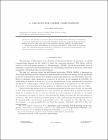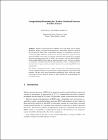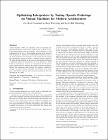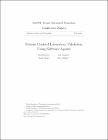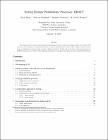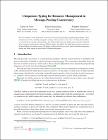Browsing by Subject "Computer sciences"
Now showing items 1-20 of 21
-
A calculus for costed computations
(2011)We develop a version of the picalculus Picost where channels are interpreted as resources which have costs associated with them. Code runs under the financial responsibility of owners; they must pay to use resources, but ... -
Compositional Reasoning for Markov Decision Processes
(2011)Markov decision processes (MDPs) have long been used to model qualitative aspects of systems in the presence of uncertainty. However, much of the literature on MDPs takes a monolithic approach, by modelling a system as a ... -
Extending a Knowledge-based Network to support Temporal Event Reasoning
(IEEE, 2010)While the polling or request/response paradigm adopted by many network and systems management approaches form the backbone of modern monitoring and management systems, the most important and interesting events, faults, ... -
Federated homes: Secure sharing of home services
(IEEE, 2011)This paper presents an architecture which allows consumers to securely share the services available in their home networks with remote third parties. It is implemented as a software service which can be installed on a ... -
First-Order Reasoning for Higher-Order Concurrency
(2009)By combining and simplifying two of the most prominent theories for HO! of Sangiorgi et al. and Jeffrey and Rathke [15, 4], we present an effective first-order theory for a higher-order picalculus. There are two significant ... -
The future of enterprise groupware applications
(Springer, 2000)We are currently witnessing a convergence of several threads of technology and business imperatives. A new model for business organisations, the Virtual Enterprise (VE) is emerging. The new model is based on the idea ... -
Leaky or Guessable Session Identifiers
(IEEE, 2011)Many Internet and Web applications use session identifiers. Too often, developers of those applications make the bad assumption that all is well because session identifiers are only known to authorized users. However, in ... -
Model-driven engineering of planning and optimisation algorithms for pervasive computing environments
(2011)This paper presents a model-driven approach to developing pervasive computing applications that exploits design-time information to support the engineering of planning and optimisation algorithms that reflect the presence ... -
Opportunistic Detection of Relative Mobility in Wireless Sensor Networks
(IEEE, 2010)In highly mobile ad hoc networks the neighbourhood status evolves rapidly. Routing tables which are populated with an ?out of date? view of the neighbourhood produce an overhead in the routing process which can affect ... -
Optimizing interpreters by tuning opcode orderings on virtual machines for modern architectures
(ACM, 2011)Virtual machines (VMs) are commonly used to implement programming languages such as Java, Python and Lua. VMs are typically implemented using an interpreter, a JIT compiler, or some combination of the two. A long-standing ... -
Patient-Centred Laboratory Validation Using Software Agents
(2008)Guidelines are self-contained documents which healthcare professionals reference to obtain knowledge about a specific condition or process. They interface with these documents and apply known facts about specific patients ... -
A practical solution for achieving language compatibility in scripting language compilers
(2012)Although scripting languages have become very popular, even mature scripting language implementations remain interpreted. Several compilers and reimplementations have been attempted, generally focusing on performance. Based ... -
Process Behaviour: Formulae vs. Tests
(2010)Process behaviour is often defined either in terms of the tests they satisfy, or in terms of the logical properties they enjoy. Here we compare these two approaches, using extensional testing in the style of DeNicola, ... -
Real Reward Testing for Probabilistic Processes
(2011)We introduce a notion of real reward testing for probabilistic processes by extending the traditional nonnegative reward testing with negative rewards. In this testing framework, the may and must preorders turn out to ... -
Report on an Arctic summer DTN trial
(Springer, 2011)Delay- and disruption-tolerant networking (DTN) is an emerging area of networking research that will benefit from real-world trials and testbeds. We describe a week long DTN trial carried out during the summer of 2009 in ... -
Software Agents Representing Medical Guidelines.
(2008)Guidelines are self-contained documents which healthcare professionals reference to obtain specific disease or medical condition knowledge for a particular population cohort. They view these documents and apply known ... -
Testing Finitary Probabilistic Processes
(2009)This paper provides modal- and relational characterisations of may- and must-testing preorders for recursive CSP processes with divergence, featuring probabilistic as well as nondeterministic choice. May testing is ... -
A Testing Theory for a Higher-Order Cryptographic Language
(2011)We study a higher-order concurrent language with cryptographic primitives, for which we develop a sound and complete, rstorder testing theory for the preservation of safety properties. Our theory is based on co-inductive ... -
Uniqueness Typing for Resource Management in Message-Passing Concurrency.
(2010)We view channels as the main form of resources in a message-passing programming paradigm. These channels need to be carefully managed in settings where resources are scarce. To study this problem, we extend the pi-calculus ... -
What makes a great mobile digital art exhibition
(Hacettepe University Department of Information Management, 2011)Passive reception and consumption of art is a given, in our times. Artists produce. Spectators consume. At the nexus stands the curator who chooses the produce and the exhibitor who provides the space for consumers. This ...




